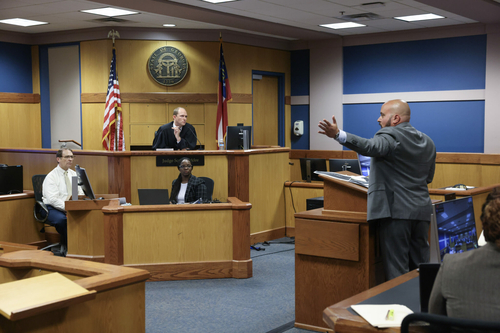The significant legal development in the Fulton County elections interference racketeering case specifically focusing on the decision by Judge Scott McAfee to deny the defendants Sidney Powell and Kenneth Chesebro’s request for separate trials and to order them to stand trial together.

Joint Trial Ordered for Sidney Powell and Kenneth Chesebro in Fulton County Elections 2020 Racketeering Case
Rough Draft Atlanta – Two defendants, Sidney Powell and Kenneth Chesebro, charged in the Fulton County elections 2020 interference racketeering case, will face trial together on October 23rd. This decision came after a 75-minute hearing, during which Fulton County Superior Court Judge Scott McAfee denied their request to have separate trials. The case alleges that Powell and Chesebro were part of a broader conspiracy to overturn the 2020 presidential election in Georgia, which was won by Democrat Joe Biden.
Despite arguments from Powell and Chesebro’s attorneys, who claimed that their cases should be tried separately due to a lack of contact between the co-defendants and unrelated circumstances surrounding their charges, Judge McAfee ordered them to be tried together.
Fulton County District Attorney Fani Willis aims to have Trump and the 18 other co-defendants stand trial at the same time, although no trial date has been set for them yet. The defendants are charged under Georgia’s RICO Act, which allows multiple defendants to be tried together, even if they do not have direct ties or knowledge of one another. Chesebro’s charges relate to his involvement in developing a strategy to implement false GOP electors in Georgia and other states in favor of Trump, while Powell faces multiple felony counts for allegedly hiring a team of computer forensic experts involved in a voting system breach in Coffee County weeks after the 2020 election.
READ ALSO: OnlyFans Founder Leonid Radvinsky Paid Himself Over $1 Million Every Day
19 Defendants Await Joint Trial in Fulton County Elections Case
As indicated in the article of Georgia Recorder, prosecutors argue that trying all 19 defendants simultaneously is the most feasible approach, estimating a four-month trial with approximately 150 witnesses. Defense attorneys raised concerns about potential jury bias and a complex trial but were overruled by Judge McAfee, who acknowledged the challenges of such a large trial.
Additionally, the case could face delays pending a federal court ruling on whether certain defendants, including former Trump White House chief of staff Mark Meadows, should have their cases removed from state court, as Trump’s attorneys argue that preparing a strong defense will require more time than the two months leading up to the October 23rd trial date.